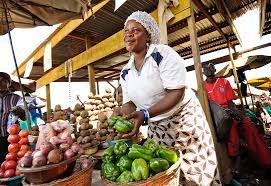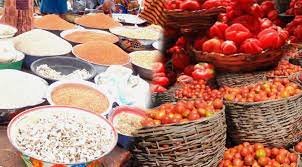In recent findings the Nigerian economic situation is facing a serious challenge that economic pundits have yet to find better terms to describe it. But it remains unarguably that food crisis occasioning acute hunger is biting severely in the country, as Korede Abdullah captures in this report.
Food Prices Skyrocket
Since the last quarter of 2023, Nigerians from all economic strata have continued to lament the crunching effects of food crisis that have hit the nation like tornado. As a result, food prices have skyrocketed and reached the stratosphere.
Those worst hit are the poor and the low-income earners who are already finding it difficult to keep their heads above water.
As it currently stands, according to experts, the food crisis may linger more than anticipated, as its underlying drivers show no signs of abating; instead, they continue to gather momentum and worsen the situation. All the economic indices have shown a grim picture which casts a dark ominous cloud on a country of more than two hundred million people!
With the recent figures from the National Bureau of Statistics, NBS, released in the first quarter of 2024 ending in April, painting a grim reality, many Nigerians, especially the core agricultural stakeholders, have continued to raise their concern as to when the pall of uncertainty and looming instability threatening the wellbeing of the people will come to an end.
Lagos Markets
Africa Health Report’s (AHR) correspondent visited some market places in Igando, Ikotun and Iyana-Ipaja, all in Alimosho Local Government Area of Lagos State, to make an on-the-spot assessment of the current prices of consumer goods, especially food items. What was discovered in terms of soaring prices was jaw-dropping.

As of April 2023, a bag of short long grain rice was forty-five-thousand naira as against the current price of seventy-eight-thousand naira. The most outrageous is the price of beans whose bag was fifty-eight-thousand naira last year which has astronomically jumped to four-fifty-thousand naira!
Garri, Yam Flour used for Amala, Spaghetti, Noodles,
Likewise the prices of wheat, semolina, garri, yam flour used for amala, spaghetti, noodles, crates of eggs, meat, chicken, palm oil and vegetable oil, and other food items surveyed by our correspondent have all hit the rooftop. Even soup ingredients like tomatoes and pepper are beyond what an average Nigerian who is currently confronted with economic hardship can afford.
Causes of Food Crisis in Nigeria
The first thing mentioned by most of Nigerians who spoke with Africa Health Report was insecurity, especially in the north. Dr Israel Ojo, an agricultural economist and lecturer at the Ekiti State University, Ado-Ekiti, who spoke with our correspond on the phone said the problem has been exacerbated by the relentless killings of farmers in the north and some other parts of the country.
According to the don: “The ongoing violence in the north and some other places has dealt a huge blow on the food food production in Nigeria.”
Worrisome
In the face of food crisis, what’s worrisome is how it has become a festering sore thumb that refuses to go. Insecurity in the country is an albatross over the agrarian communities, especially in the north, making it increasingly difficult for farmers to attend to their crops and for food to get to those who need it most.

Despite the relentless efforts of the military to nip them in the bud, the arm-carrying militias and murderous bandits are still on the prowl like a ferocious tiger baying for preys to devour.
Mr Ahmed Yusuf, an economist and World Bank consultant also echoed the views of many Nigerians while speaking with Africa Health Report. He gave other factors for the food crisis apart from insecurity. According to him, the factors include urbanization, climate change and not-well-thought-out removal of fuel subsidy by President Tinubu on assumption of office on May 29, 2023.
Economic Impacts of Food Crisis
Economic experts observed that food crisis has a lot of far-reaching economic effects. The major one which they said is inflation. The increase in prices of consumer goods, especially, food, leading to higher inflation rates, invariably reduces purchasing power of the people and affects overall economic stability.
According to available data, the current high prices of food items being experienced in Nigeria have been influenced by the inflation rate which has risen steadily since February. In its April report, National Bureau of Statistics, said the rate of inflation rose to 33.69%, up from 33.20% in March 2024, marking an increase of 0.49% points.
NBS Data
The NBS data further indicates that food inflation has surged by a whopping 2.09 percent, shutting it from 37.92 percent to a shocking 40.01 percent compared to the previous year. This represents a worrying increase of 15.56 percentage points compared to the same time last year, painting a gripping picture of escalating hardship for ordinary Nigerians.
Also reeling out the latest data for the second quarter of 2024, NBS said, Nigeria’s inflation rate increased to 33.95 per cent in May 2024.
NBS said this represents an increase of 0.26% points when compared to the April 2024 headline inflation rate, according to the Consumer Price Index report released on Saturday.
The data revealed that on a year-on-year basis, the headline inflation rate was 11.54% points higher compared to the rate recorded in May 2023, which was 22.41%.
This shows that the headline inflation rate (year-on-year basis) increased in May 2024 when compared to May 2023.
On the contrary, on a month-on-month basis, the headline inflation rate in May 2024 was 2.14%, which was 0.15% lower than the rate recorded in April 2024 (2.29%).
The aftermath of the above uninspiring scenario (inflation), experts opined, is widespread poverty. The implication is that, households now spend a larger portion of their income on food, leaving fewer resources for other essential needs.
Malnutrition And Hunger
Another impact of the crisis is malnutrition and hunger which is staring the nation in the face. Mr Yusuf noted that malnutrition and hunger lead to reduced productivity, cognitive impairment, and long-term health issues, which in the long run, affect human capital and economic potential.
Nigerians, including the experts who spoke with the newspaper all agreed that the only solution to food crisis is for the government to brace up and face the problem frontally. They posited that government should strengthen security forces, improve intelligence gathering, and deploy more troops to vulnerable areas. The crux of the matter is, will Tinubu government take up the gauntlet? Time will tell.



